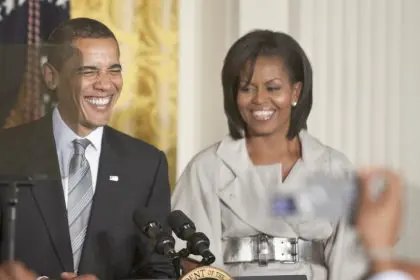 Former Secretary of State and college professor Condoleezza Rice grew up in a violent caste system in Birmingham, Ala. She had no white friends. She was not allowed to go get a hamburger at the old Woolworth shopping center, then one of the town’s main watering holes. Birmingham was the capital of the old Deep South, the epicenter of Jim Crowism that repressed its black population through fear, laws and regular, random terrorism.
Former Secretary of State and college professor Condoleezza Rice grew up in a violent caste system in Birmingham, Ala. She had no white friends. She was not allowed to go get a hamburger at the old Woolworth shopping center, then one of the town’s main watering holes. Birmingham was the capital of the old Deep South, the epicenter of Jim Crowism that repressed its black population through fear, laws and regular, random terrorism.
Rice shares her experiences of growing up with Rev. Al Sharpton for “Politics Nation” on the 50th anniversary of the bombing of the Sixteenth Street Baptist Church in Birmingham, which happened just two weeks after the legendary March on Washington and Dr. Martin Luther King’s “I Have a Dream” speech on the steps of the Lincoln Memorial. The racist gatekeepers of the old Birmingham let Dr. King know what they thought about his “dream.”
Rice was just 8-years-old at the time of the church bombing. The senseless murders took away both a childhood friend she used to play dolls with, and Rice’s youthful sense of security.
“As an 8-year-old, you don’t think about terror of this kind,” said Rice, who recounted on Friday her memory of the bombing and its aftermath in remarks to a gathering of civic leaders in Birmingham as part of several days of events leading up to the 50th anniversary of the bombing on Sept. 15.
Rice’s hometown had become a place too dangerous for black children to leave their own neighborhoods, or go downtown and visit Santa Claus, or go out of the house after dark.
“There was no sanctuary. There was no place really safe,” she said.
Rice’s friend, 11-year-old Denise McNair, died in the blast along with 14-year-olds Carole Robertson, Addie Mae Collins and Cynthia Wesley. Their murders by members of the Ku Klux Klan greatly amplified the already growing support for passage of the Civil Rights Act of 1964.
According to reports, there were 50 “unsolved” bombings throughout Birmingham from the late 1940s through the mid-1960s. The frequency of these unsolved bombings earned the town the dubious nickname “Bombingham.”
But it was the one that went off at the 16th Street Baptist Church, September 15, 1963, that riveted a nation to its core.
Half a century later, the murder of the four little girls was remembered by President Barack Obama in Washington with a congressional gold medal.
Proving that progress was possible for children raised in such horror, Rice, of course, went on to become one of the most powerful black women in the world. Another of the four murdered girls’ childhood friends, William Bell, is now mayor of Birmingham, an accomplishment that was unfathomable 50 years ago.
Evidence of a new Birmingham is manifested with a thriving downtown, world-class hospital, and talk of landing an NBA team.
All of that will be the backdrop this weekend as a new city remembers its dark past, but also celebrates what it has become.
Take a look at what Rice, who was the National Security Advisor and then Secretary of State under former President George W. Bush, had to say about a Birmingham that New Millennials would not even recognize today (courtesy of NBCNews.com).













